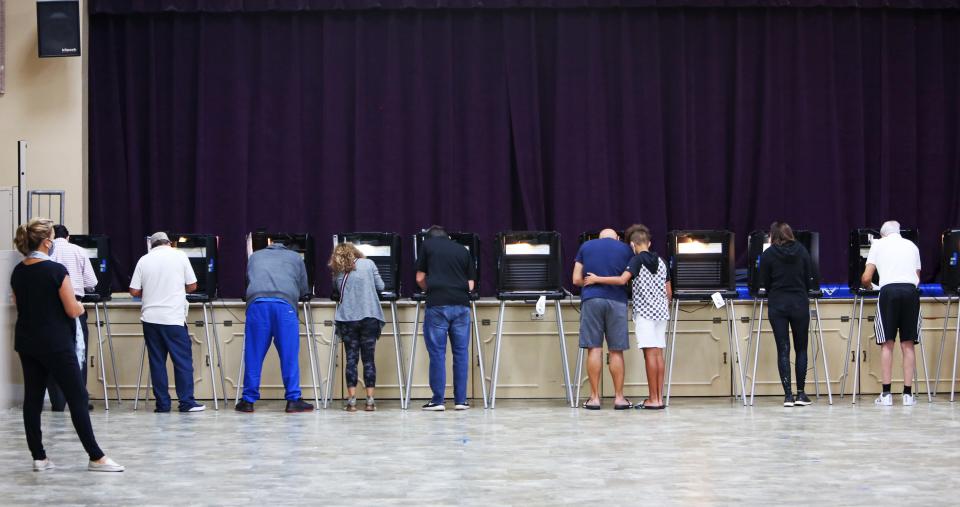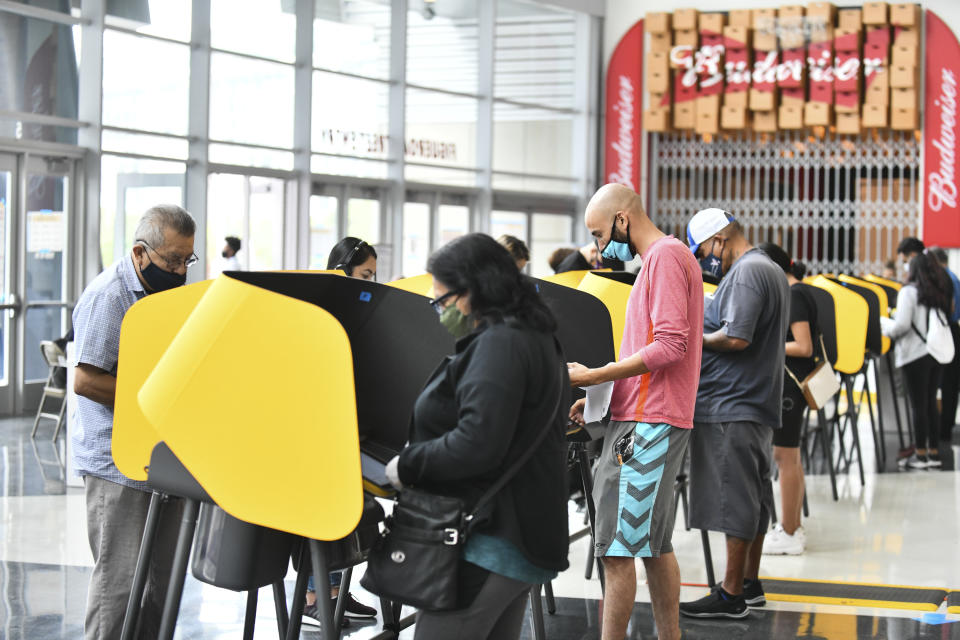Here are the results of the 12 state ballot measures that could affect your personal finances
It wasn’t just political office-seekers on the ballot this week. Seven states also feature state-level ballot measures that could affect your personal finances, careers, and housing.
From income taxes to rental control to a higher minimum wage, this is how states voted on issues that could affect your wallet.
Arizona
Proposition 208 looks likely to pass, with 98% of precincts reporting and 52.56% of voters in favor and 47.44% against the initiative, according to Ballotpedia.org.
If passed, it would enact a new tax on higher earners to fund education initiatives. Under the initiative, single taxpayers earning more than $250,000 or joint filers with income above $500,000 would be subject to an additional 3.5% income tax, on top of the existing income tax of 4.5%. The revenue would fund teacher and classroom support staff salaries, teacher mentoring and retention programs, career and technical education programs, and the Arizona Teachers Academy.

Arkansas
Arkansas passed Issue 1, which continues the 0.5% sales tax, which supports Arkansas’s transportation infrastructure, including highways, roads, streets, and bridges. The sales tax was set to expire in 2023 if the issue did not pass.
California
Proposition 16 did not pass, with 83% of precincts reporting and 56.04% against the measure and 43.96% in favor, according to Ballotpedia.org.
If passed, it would allow public universities and local and state governments — among other institutions — to consider race, sex, color, ethnicity, or national origin when hiring or addressing diversity in admissions issues. The proposition would reinstate affirmative action programs in California, reversing 1996’s Proposition 209 that bans preferential treatment by the government and public institutions based on those same factors.
Proposition 19 looks likely to pass, with 83% of precincts reporting and 51.55% in favor of the measure and 48.45% against, according to Ballotpedia.org.
The proposition would allow homeowners to transfer their tax assessments anywhere within the state and allow tax assessments to be transferred to a more expensive home with an upward adjustment. This will increase the number of times someone over age 55 or those with severe disabilities can transfer their tax assessments from one to three. It would also require that inherited homes that are not principal residences be reassessed at their market value when passed on to a new owner. The additional revenue or net savings from the initiative would help wildfire agencies and counties.
Proposition 21 did not pass. The measure would have allowed local governments to enact rent control on housing over 15 years old. It would also have allowed local limits on yearly rent increases to differ from the current statewide limit. It also would have allowed for rent increases on rent-controlled housing up to 15% over three years at the start of new tenancy.
Proposition 22 has passed. The measure exempts gig companies like Uber, Lyft, and DoorDash from following state laws that require treating their workers as employees. The measure keeps delivery drivers employed through those apps classified as independent contractors. It also provides workers with narrower benefits like pay at 120% of California's $13 per hour minimum wage, health care stipends, and accident insurance.

Colorado
Proposition 116 passed. It decreases the state income tax rate from 4.63% to 4.55% for individuals, estates, trusts, and foreign and domestic C-corporations operating in the state.
Proposition 118 also passed in the state. It funds 12 weeks of paid family and medical leave for new parents with an additional 4 weeks given to parents who experience pregnancy or childbirth complications. The proposition also guarantees that employees who request or use their paid leave will be able to return to the same position with the same pay, benefits, and seniority or status. The paid leave will be funded by a payroll tax split evenly by employers and employees starting in 2023.
Amendment B also passed. It repeals the Gallagher Amendment, which set residential and non-residential property tax assessment rates in the state constitution. Amendment B also allows the Colorado State Legislature to freeze property tax assessment rates at the current rates, which are 7.15% for residential property and 29% for nonresidential property. The amendment also allows state legislature to provide property tax assessment rate decreases through state law.
Florida
Amendment 2 looks likely to pass, with 98% of precincts reporting and 60.80% in favor of the measure and 39.20% against, according to Ballotpedia.org.
The amendment would raise Florida’s minimum wage incrementally until it reaches $15 per hour in 2026. The current minimum wage is $8.56 per hour. The minimum wage would go up to $10 per hour at the end of September 2021, and it would continue to increase each September until it reaches the $15 threshold in 2026. After that, the minimum wage would be adjusted annually for inflation as it is now.

Illinois
The Illinois Allow for Graduated Income Tax Amendment did not pass. The measure would have repealed the state’s constitutional requirement that the Illinois personal income tax be a flat tax, which assesses one tax rate for all taxpayers, regardless of income. The amendment would also have allowed the state to enact a graduated income tax, which assesses higher tax rates on higher levels of income.
Nebraska
Initiative 428 passed, which will change the state’s payday lending practices on how much payday lenders are permitted to charge borrowers by removing the existing limits of $15 per $100 loaned and a $500 loan limit every 34 days. Per-loan transactions also will be replaced with an annual limit of 36%, and the initiative also prohibits payday lenders from marketing, offering, or guaranteeing loans with interest rates exceeding 36%.
Dhara, Denitsa, and Stephanie are reporters Yahoo Money and Cashay. Follow them on Twitter at @Dsinghx, @denitsa_tsekova, and @SJAsymkos.
Read more:
Democrats get more optimistic about their future finances as the election nears
Biden's Social Security and SSI plan would lift 1.4 million out of poverty, study finds
225,000 couples owe a collective $3.7 billion for weddings that didn't happen in 2020
Read more personal finance information, news, and tips on Cashay

 money
money 